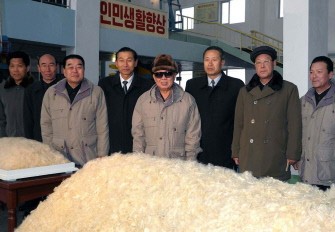SEOUL, Feb 10, 2010 (AFP) - A top UN envoy pressed on Wednesday with attempts to bring North Korea back to nuclear disarmament talks, amid speculation Pyongyang is desperate to end its international isolation.
UN chief Ban Ki-moon's top political adviser Lynn Pascoe is making a four-day visit to the North -- the first by a high-level UN official since 2004.

The North's nuclear negotiator Kim Kye-Gwan is also expected to hold more talks Wednesday in the Chinese capital after discussions Tuesday with Beijing's representatives, Yonhap news agency said.
The South Korean agency, quoting diplomatic sources, said the talks were thought to focus on Pyongyang's terms for returning to the six-nation dialogue which has been running on and off since 2003.
The North angrily quit the talks last April following international criticism of its ballistic missile launch. It staged its second nuclear test the following month and vowed to restart plutonium production.
Before it returns to dialogue, Pyongyang is demanding a lifting of UN sanctions and a US commitment to start talks about a permanent peace treaty.
But some analysts believe the North is now desperate to end its international isolation as food shortages grow and the overall economic situation worsens.
South Korea's unification ministry estimated Wednesday that the communist state faces a shortfall of 1.29 million tons of grain this year, equivalent to almost four months' food supply.
"North Korea desperately wants a breakthrough to revive its worsening economy," Yang Moo-Jin of Seoul's University of North Korean Studies told AFP Tuesday, saying the six-party talks would likely resume in March.
Kim Kye-Gwan travelled Tuesday to Beijing on the same plane as departing senior Chinese official Wang Jiarui. Wang had met leader Kim Jong-Il, who reaffirmed his commitment in principle to denuclearisation.
South Korea's ambassador to China, Yu Woo-Ik, told reporters in Seoul the visits by Kim Kye-Gwan and Wang were "positive signs" although he was not sure when the six-party talks might resume.
In Washington the State Department urged the North to act.
"North Korea is saying the right things, that the six-party process should resume, and that it remains committed to denuclearisation," said spokesman Philip Crowley. "But the right words must be followed by action."
Washington says the North must come back to the talks and reaffirm commitment to previous agreements before other matters are discussed.
Pascoe, the UN under-secretary general for political affairs, was expected to meet Foreign Minister Pak Ui-Chun and other officials for talks on issues ranging from the nuclear programme to humanitarian aid, China's Xinhua news agency has reported from Pyongyang.
International aid to North Korea, which suffered a full-blown famine in the 1990s, has largely dried up or been rejected as political tensions grew over its weapons programmes.
Tighter UN sanctions imposed last June have also crimped the North's weapons exports, an important earner in the past.
Last November's shock currency revaluation aimed at clamping down on free-market activities sent prices soaring and provoked some outbreaks of violent unrest, according to South Korean groups.
Welfare group Good Friends said in its newsletter that the North's Premier Kim Yong-Il, who is in charge of the economy under supreme leader Kim Jong-Il, has apologised for the bungled exercise.







)
















